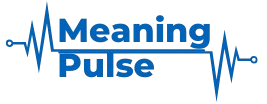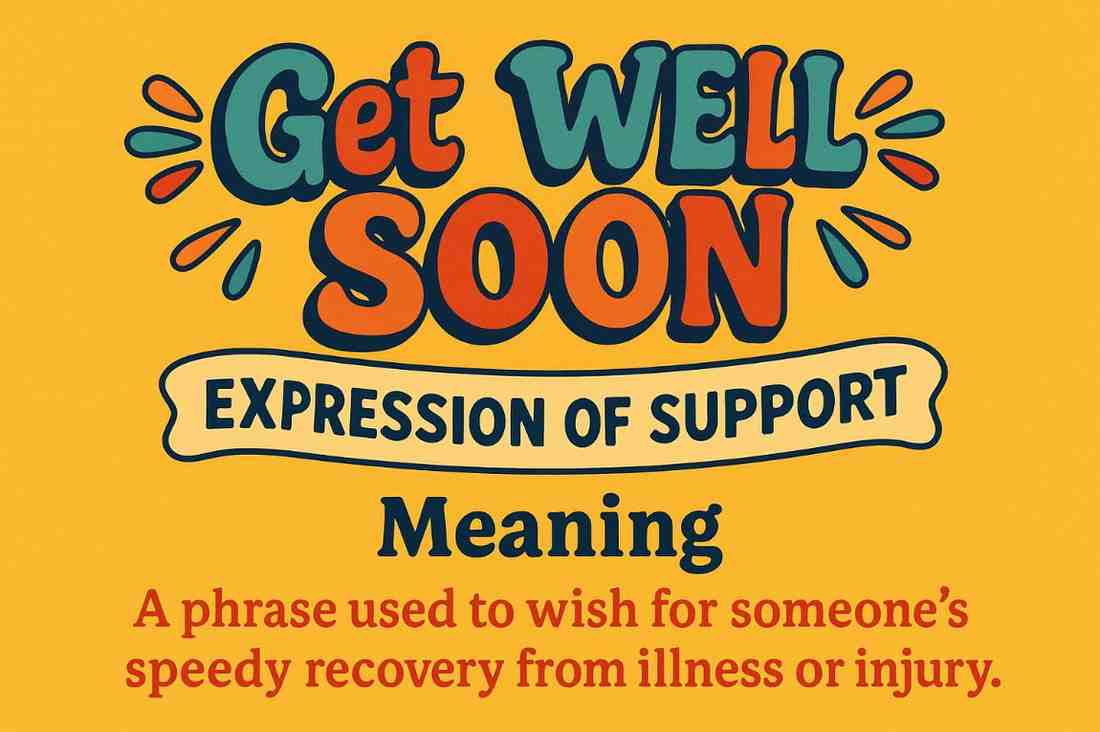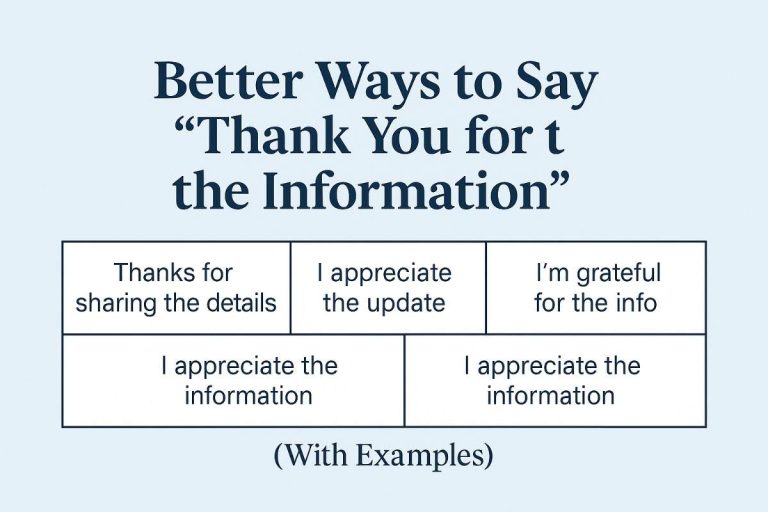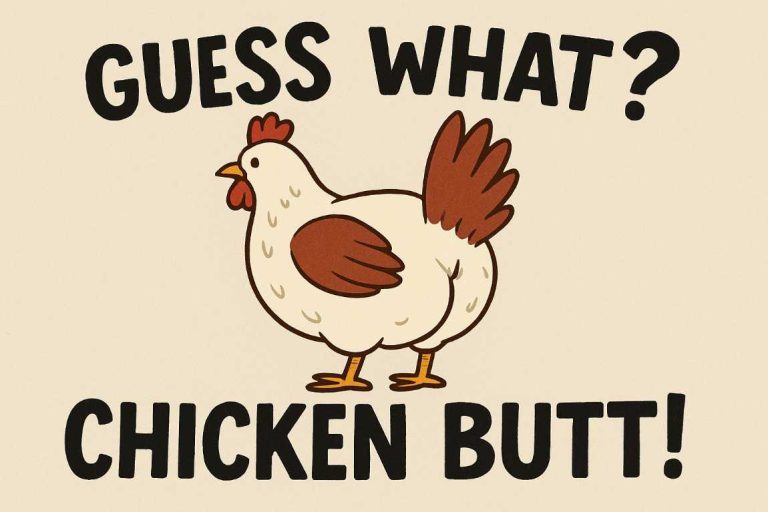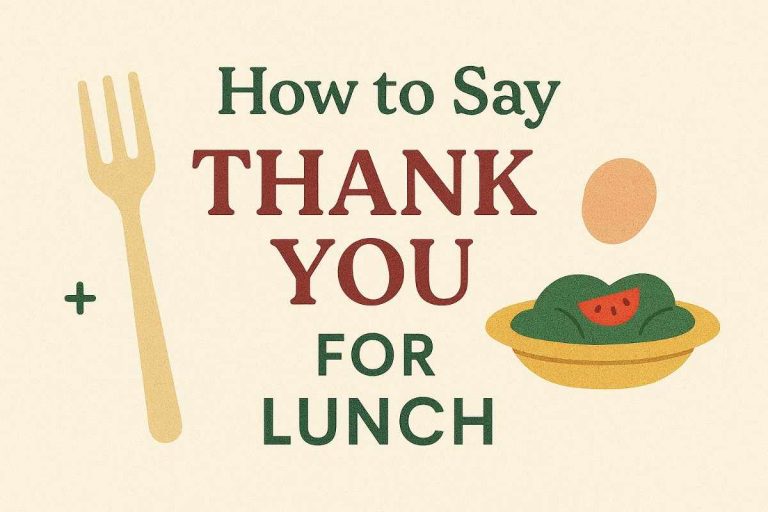25 Creative Alternatives to Saying “Get Well Soon”
“Get well soon” is one of those phrases we toss around when someone’s under the weather. It feels automatic, right? But even though it’s short and sweet, it carries weight. We use it to show we care, to offer comfort, and sometimes because we just don’t know what else to say. This article digs into what “get well soon” really means, where it came from, how to use it—and what to say when those words don’t quite cut it.
What Does “Get Well Soon” Really Mean?
At its core, “get well soon” is a wish. It’s saying, “I hope you recover quickly.” It’s often used when someone is sick, injured, or going through something health-related. The tone? Warm, thoughtful, supportive. It works in both casual and formal settings. From a text to your coworker to a card for your grandmother—it fits.
But here’s the thing: it’s more than just a formality. Saying “get well soon” lets someone know you noticed they’re not doing great. It tells them you’re rooting for them, even in a small way.
The Origins and History of the Phrase
So, where did this phrase come from? “Get well soon” dates back to the late 19th century. As healthcare improved and personal letters became more common, the phrase started showing up in sympathy and support notes. Victorian-era etiquette promoted polite well-wishing. Even today, it remains a go-to phrase for sympathy cards, hospital visits, and quick texts.
When to Use “Get Well Soon” in Daily Conversation
- After a friend says they’re feeling sick: “Ah, bummer. Hope you get well soon.”
- If a coworker takes medical leave: “Wishing you a speedy recovery. Get well soon.”
- When visiting someone in the hospital: “Hang in there. Hope you get well soon.”
- In professional emails: “Wishing you well and hoping for a swift recovery.”
It’s flexible. Just make sure it sounds genuine. You don’t want it to feel robotic.
How to Respond to “Get Well Soon”
Got a message saying “get well soon”? Don’t overthink it. Here are a few natural replies:
- “Thanks, I really appreciate that.”
- “Means a lot, thank you.”
- “Trying my best to!”
- “Thanks—hoping to be back on my feet soon.”
It doesn’t need to be elaborate. A simple thank-you does the job. But if the person’s close to you, feel free to open up a bit more.
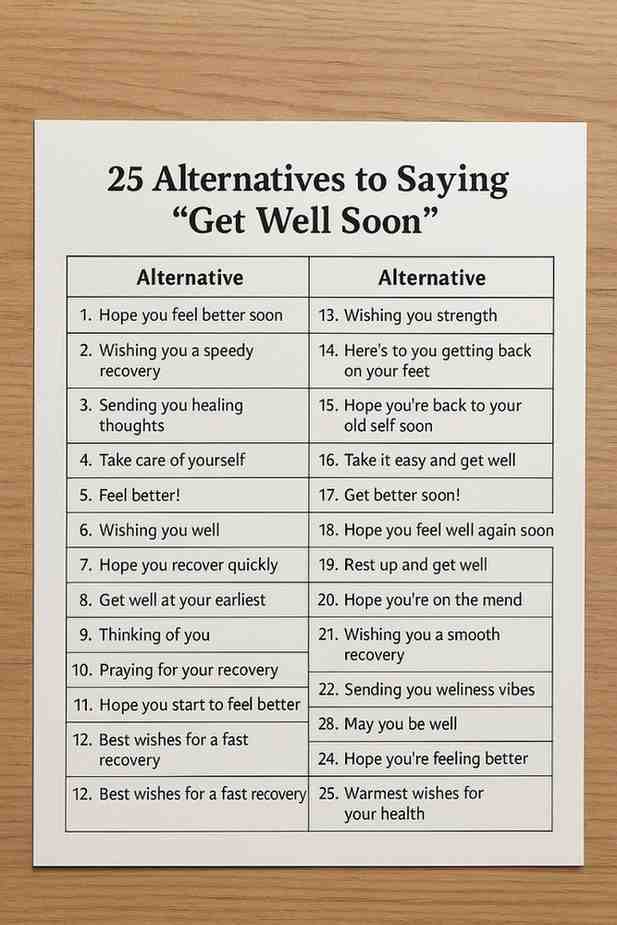
Read Also – 20 Heartwarming Ways to Say Good Morning to Loved Ones
25 Alternatives to Saying “Get Well Soon”
Let’s be honest—sometimes “get well soon” sounds overused. Here are 25 alternatives, each with its own tone, meaning, and perfect situation.
- Wishing you a speedy recovery
- Meaning: Hoping your healing is quick
- Definition: A slightly more formal version of “get well soon.”
- Scenario: Use in emails or cards to coworkers.
- Tone: Professional, polite
- Best Use: Office settings, formal notes
- Hope you feel better soon
- Meaning: Wishing improved health in the near future
- Definition: Casual and heartfelt
- Scenario: Texting a friend with the flu
- Tone: Warm, friendly
- Best Use: Casual relationships
- Take care of yourself
- Meaning: Look after your health
- Definition: Shows concern and advice in one
- Scenario: Saying goodbye to a sick colleague
- Tone: Caring, calm
- Best Use: Professional or friendly
- Sending healing thoughts
- Meaning: Offering emotional support
- Definition: Non-religious way to show empathy
- Scenario: Writing in a get-well card
- Tone: Gentle, thoughtful
- Best Use: Sensitive situations
- Rest up and feel better
- Meaning: Encouraging rest for recovery
- Definition: Light and comforting
- Scenario: After someone says they’re taking a sick day
- Tone: Casual, supportive
- Best Use: Friends and family
- Hang in there
- Meaning: Stay strong through difficulty
- Definition: Meant to uplift and comfort
- Scenario: For someone in long-term treatment
- Tone: Encouraging
- Best Use: Emotional support
- Wishing you strength and wellness
- Meaning: Hoping for recovery and resilience
- Definition: Strong, positive message
- Scenario: Serious illness or surgery
- Tone: Empathetic
- Best Use: More serious health challenges
- Thinking of you
- Meaning: You’re on my mind
- Definition: Shows quiet support
- Scenario: When someone’s going through a tough time
- Tone: Subtle, kind
- Best Use: Any health struggle, especially mental health
- Get some rest
- Meaning: Encouraging sleep and downtime
- Definition: Simple suggestion to take it easy
- Scenario: After someone cancels plans
- Tone: Gentle
- Best Use: Minor illnesses
- Hope each day brings you closer to full health
- Meaning: Steady recovery
- Definition: Long-term encouragement
- Scenario: Chronic illness recovery
- Tone: Patient, hopeful
- Best Use: Long-term recovery
- Praying for your recovery
- Meaning: Offering spiritual support
- Definition: Religious sentiment
- Scenario: Religious communities, close families
- Tone: Faith-based, sincere
- Best Use: When faith is shared
- Take all the time you need
- Meaning: Don’t rush healing
- Definition: Supports rest without pressure
- Scenario: Supporting a coworker or friend
- Tone: Reassuring
- Best Use: Stress-related illness, burnout
- Can’t wait to see you back on your feet
- Meaning: Looking forward to their recovery
- Definition: Encouraging return to normalcy
- Scenario: Friend out with the flu
- Tone: Friendly
- Best Use: Short-term illness
- You’ve got this
- Meaning: Confidence in their strength
- Definition: Empowering message
- Scenario: Difficult treatment phase
- Tone: Bold, motivational
- Best Use: Emotional resilience
- Hope you bounce back soon
- Meaning: Hoping for quick recovery
- Definition: Casual, sporty tone
- Scenario: Sports injuries or sprains
- Tone: Playful
- Best Use: Athletic friends, teens
- Sending positive vibes your way
- Meaning: Emotional encouragement
- Definition: Non-religious positive energy
- Scenario: Instagram captions, texts
- Tone: Light, modern
- Best Use: Social media, friends
- Take it easy
- Meaning: Don’t push yourself
- Definition: Suggests rest and calm
- Scenario: Overworked colleague on sick leave
- Tone: Relaxed, caring
- Best Use: Casual workplace chats
- Hope things look up soon
- Meaning: Optimism for better days
- Definition: Encouraging outlook
- Scenario: General health downturn
- Tone: Lightly hopeful
- Best Use: Mental or physical health dips
- Feel better one step at a time
- Meaning: Healing takes time
- Definition: Realistic encouragement
- Scenario: Post-surgery recovery
- Tone: Grounded, comforting
- Best Use: Long recoveries
- You’re in my thoughts
- Meaning: Ongoing concern and care
- Definition: Gentle support
- Scenario: Writing a sympathy note
- Tone: Soft, sincere
- Best Use: Serious or long-term illnesses
- Let yourself rest
- Meaning: Permission to relax
- Definition: Encouraging downtime
- Scenario: For anxious or stressed individuals
- Tone: Gentle, affirming
- Best Use: Mental health breaks
- I’m here if you need anything
- Meaning: Offering help
- Definition: Invitation for support
- Scenario: Texting a friend recovering at home
- Tone: Caring
- Best Use: Close relationships
- Wishing you peace and rest
- Meaning: Hoping for calm and healing
- Definition: Emotional and physical wellness
- Scenario: Times of high stress
- Tone: Soothing
- Best Use: Emotional exhaustion
- Hope your health improves every day
- Meaning: Slow and steady improvement
- Definition: Patient encouragement
- Scenario: Chronic illness or recovery
- Tone: Supportive
- Best Use: Any situation
- Take good care
- Meaning: Self-care reminder
- Definition: Short and thoughtful
- Scenario: Quick email signoff
- Tone: Polite
- Best Use: Everyday conversations
Conclusion
“Get well soon” might seem like a small phrase, but it holds a quiet kind of power. Whether you say it straight or use a heartfelt alternative, the goal’s the same—let the other person know you’re thinking of them. In a world where people rush past each other, those few words can stop someone in their tracks and remind them they’re not alone. And sometimes, that’s all they need.
